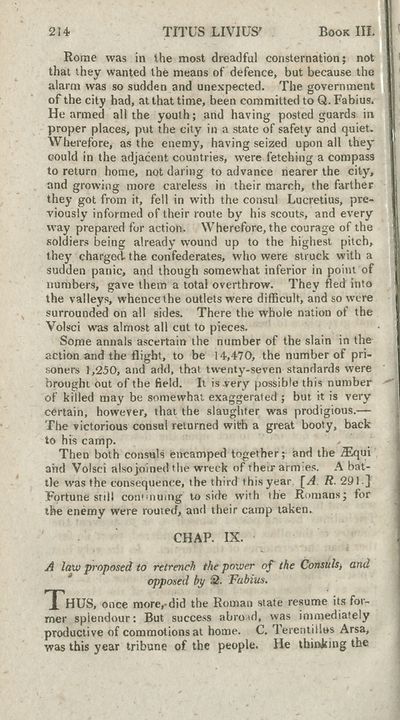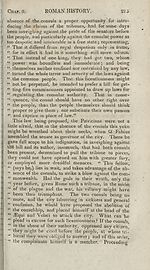Download files
Complete book:
Individual page:
Thumbnail gallery: Grid view | List view

214.
TITUS LIVIUS'
Book III.
Rome was in the most dreadful consternation; not
that they wanted the means of defence, but because the
alarm was so sudden and unexpected. The government
of the city had, at that time, been committed to Q. Fabius.
He armed all the youth; and having posted guards in
proper places, put the city in a state of safety and quiet.
Wherefore, as the enemy, having seized upon all they
could in the adjacent countries, were fetching a compass
to return home, not daring to advance nearer the city,
and growing more careless in their march, the farther
they got from it, fell in with the consul Lucretius, pre¬
viously informed of their route by his scouts, and every
way prepared for action. Wherefore, the courage of the
soldiers being already wound up to the highest pitch,
they charged the confederates, who were struck with a
sudden panic, and though somewhat inferior in point of
numbers, gave them a total overthrow. They fled into
the valleys, whence the outlets were difficult, and so were
surrounded on all sides. There the whole nation of the
Volsci was almost all cut to pieces.
Some annals ascertain the number of the slain in the
action and the flight, to be 14,470, the number of pri¬
soners 1,250, and add, that twenty-seven standards were
brought out of the field. It is very possible this number
of killed may be somewhat exaggerated; but it is very
certain, however, that the slaughter was prodigious.—
The victorious consul returned with a great booty, back
to his camp.
Then both consuls encamped together; and the #!qui
and Volsci also joined the wreck of their armies. A bat¬
tle was the consequence, the third this year [A R. 291]
Fortune stdl continuing to side with ihe Romans; for
the enemy were routed, and their camp taken.
CHAP. IX.
A law proposed to retrench the power of the Consuls, and
opposed by &. Fabius.
Thus, once morcj-did the Roman state resume its for¬
mer splendour: But success abroad, was immediately
productive of commotions at home. C. Terentillos Arsa,
was this year tribune of the people. He thinking the
TITUS LIVIUS'
Book III.
Rome was in the most dreadful consternation; not
that they wanted the means of defence, but because the
alarm was so sudden and unexpected. The government
of the city had, at that time, been committed to Q. Fabius.
He armed all the youth; and having posted guards in
proper places, put the city in a state of safety and quiet.
Wherefore, as the enemy, having seized upon all they
could in the adjacent countries, were fetching a compass
to return home, not daring to advance nearer the city,
and growing more careless in their march, the farther
they got from it, fell in with the consul Lucretius, pre¬
viously informed of their route by his scouts, and every
way prepared for action. Wherefore, the courage of the
soldiers being already wound up to the highest pitch,
they charged the confederates, who were struck with a
sudden panic, and though somewhat inferior in point of
numbers, gave them a total overthrow. They fled into
the valleys, whence the outlets were difficult, and so were
surrounded on all sides. There the whole nation of the
Volsci was almost all cut to pieces.
Some annals ascertain the number of the slain in the
action and the flight, to be 14,470, the number of pri¬
soners 1,250, and add, that twenty-seven standards were
brought out of the field. It is very possible this number
of killed may be somewhat exaggerated; but it is very
certain, however, that the slaughter was prodigious.—
The victorious consul returned with a great booty, back
to his camp.
Then both consuls encamped together; and the #!qui
and Volsci also joined the wreck of their armies. A bat¬
tle was the consequence, the third this year [A R. 291]
Fortune stdl continuing to side with ihe Romans; for
the enemy were routed, and their camp taken.
CHAP. IX.
A law proposed to retrench the power of the Consuls, and
opposed by &. Fabius.
Thus, once morcj-did the Roman state resume its for¬
mer splendour: But success abroad, was immediately
productive of commotions at home. C. Terentillos Arsa,
was this year tribune of the people. He thinking the
Set display mode to:
![]() Universal Viewer |
Universal Viewer | ![]() Mirador |
Large image | Transcription
Mirador |
Large image | Transcription
| Antiquarian books of Scotland > Curiosities & wonders > Titus Livius' Roman history > (218) |
|---|
| Permanent URL | https://digital.nls.uk/115985765 |
|---|
| Description | Thousands of printed books from the Antiquarian Books of Scotland collection which dates from 1641 to the 1980s. The collection consists of 14,800 books which were published in Scotland or have a Scottish connection, e.g. through the author, printer or owner. Subjects covered include sport, education, diseases, adventure, occupations, Jacobites, politics and religion. Among the 29 languages represented are English, Gaelic, Italian, French, Russian and Swedish. |
|---|

